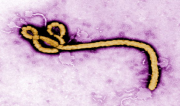Johnson & Johnson 'Fast Tracks' Ebola Vaccine Development
The race to approve the first drug to treat the Ebola virus got a new entrant recently when Johnson & Johnson (J&J) announced it would "fast-track" the development of a new vaccine.

The race to approve the first drug to treat the Ebola virus got a new entrant recently when Johnson & Johnson (J&J) announced it would “fast-track” the development of a new vaccine.
Several companies and government entities around the world have stepped up efforts to find a cure or treatment as more than 1,000 people have fallen victim to the Ebola outbreak in West Africa.
The New Jersey-based company said its proposed solution is a “prime-boost regimen, in which one vector is used to prime and the other to boost the immune response.” The vaccine is a collaborative effort using technology from Crucell N.V., which is part of the Janssen part of the J&J brand based in the Netherlands, as well as Bavarian Nordic of Denmark. Funding has also been provided by the National Institute of Allergy and Infectious Diseases.
Johnson’s Chief Scientific Officer Paul Stoffels, MD, said the company is committed to joining the fight in the current outbreak and preventing future outbreaks from taking as many lives.
“Our primary goal in this escalating Ebola epidemic is to assist governments in protecting healthcare workers, families and populations who are at high risk of being infected with Ebola as soon as possible in an effort to stop the disease from spreading further,” he said.
In addition to developing the vaccine the company said it is working to help with the current outbreak by reviewing the pathophysiology of the virus in regards to previously developed medicines. J&J is also working with Direct Relief International “to facilitate the air transport of a variety of infection prevention products,” which are being sent to Liberia and Sierra Leone through the non-profit organization.
Prior to the outbreak, Crucell and Bavarian Nordic had reportedly been working on vaccines to treat filoviruses like Ebola. They have also worked to develop a treatment specifically for the Zaire strain of the Ebola virus which has caused the most damage in the current healthcare crisis.
“In light of the current emergency in West Africa and given the evident, huge unmet medical need, we are stepping up our efforts and accelerating the Ebola program currently in pre-clinical development,” noted Johan Van Hoof, MD, Global Head, Infectious Diseases and Vaccines, Janssen and Managing Director Crucell. “We recognize the urgency of the situation and the need to collaborate with multiple partners to develop treatment and preventive solutions for Ebola.”
The company statement said the goal is to start human trials in early 2015.